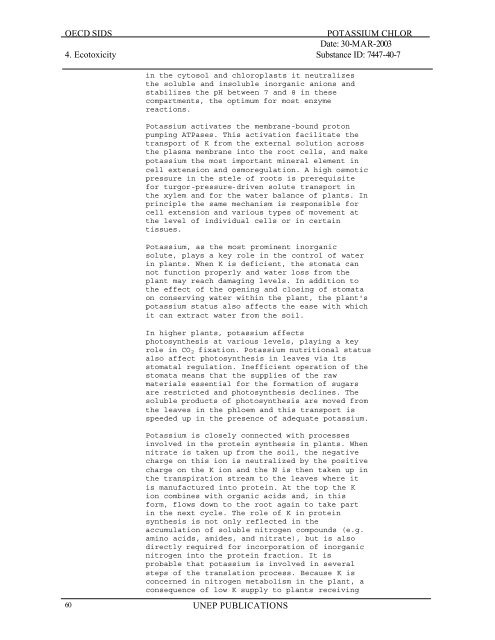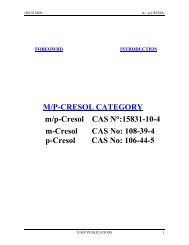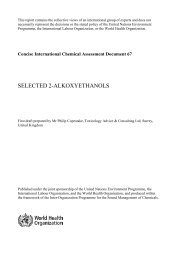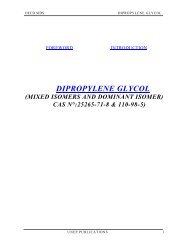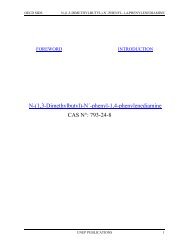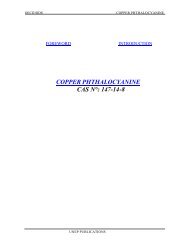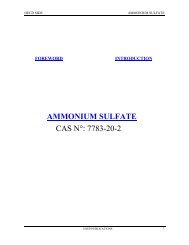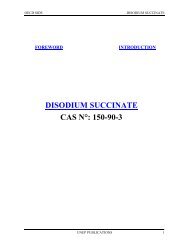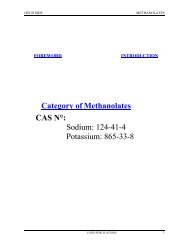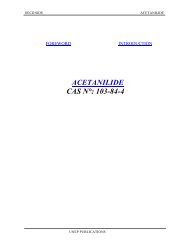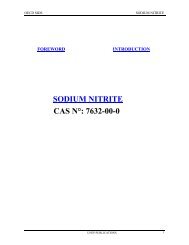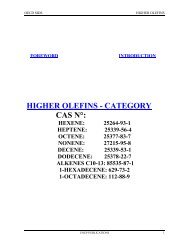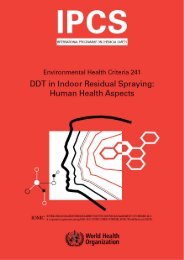POTASSIUM CHLORIDE CAS N°: 7447-40-7
POTASSIUM CHLORIDE CAS N°: 7447-40-7
POTASSIUM CHLORIDE CAS N°: 7447-40-7
You also want an ePaper? Increase the reach of your titles
YUMPU automatically turns print PDFs into web optimized ePapers that Google loves.
OECD SIDS<br />
<strong>POTASSIUM</strong> CHLOR<br />
Date: 30-MAR-2003<br />
4. Ecotoxicity Substance ID: <strong>7447</strong>-<strong>40</strong>-7<br />
in the cytosol and chloroplasts it neutralizes<br />
the soluble and insoluble inorganic anions and<br />
stabilizes the pH between 7 and 8 in these<br />
compartments, the optimum for most enzyme<br />
reactions.<br />
Potassium activates the membrane-bound proton<br />
pumping ATPases. This activation facilitate the<br />
transport of K from the external solution across<br />
the plasma membrane into the root cells, and make<br />
potassium the most important mineral element in<br />
cell extension and osmoregulation. A high osmotic<br />
pressure in the stele of roots is prerequisite<br />
for turgor-pressure-driven solute transport in<br />
the xylem and for the water balance of plants. In<br />
principle the same mechanism is responsible for<br />
cell extension and various types of movement at<br />
the level of individual cells or in certain<br />
tissues.<br />
Potassium, as the most prominent inorganic<br />
solute, plays a key role in the control of water<br />
in plants. When K is deficient, the stomata can<br />
not function properly and water loss from the<br />
plant may reach damaging levels. In addition to<br />
the effect of the opening and closing of stomata<br />
on conserving water within the plant, the plant's<br />
potassium status also affects the ease with which<br />
it can extract water from the soil.<br />
In higher plants, potassium affects<br />
photosynthesis at various levels, playing a key<br />
role in CO 2 fixation. Potassium nutritional status<br />
also affect photosynthesis in leaves via its<br />
stomatal regulation. Inefficient operation of the<br />
stomata means that the supplies of the raw<br />
materials essential for the formation of sugars<br />
are restricted and photosynthesis declines. The<br />
soluble products of photosynthesis are moved from<br />
the leaves in the phloem and this transport is<br />
speeded up in the presence of adequate potassium.<br />
Potassium is closely connected with processes<br />
involved in the protein synthesis in plants. When<br />
nitrate is taken up from the soil, the negative<br />
charge on this ion is neutralized by the positive<br />
charge on the K ion and the N is then taken up in<br />
the transpiration stream to the leaves where it<br />
is manufactured into protein. At the top the K<br />
ion combines with organic acids and, in this<br />
form, flows down to the root again to take part<br />
in the next cycle. The role of K in protein<br />
synthesis is not only reflected in the<br />
accumulation of soluble nitrogen compounds (e.g.<br />
amino acids, amides, and nitrate), but is also<br />
directly required for incorporation of inorganic<br />
nitrogen into the protein fraction. It is<br />
probable that potassium is involved in several<br />
steps of the translation process. Because K is<br />
concerned in nitrogen metabolism in the plant, a<br />
consequence of low K supply to plants receiving<br />
60<br />
UNEP PUBLICATIONS


